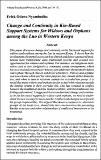| dc.description.abstract | This paper discusses change and continuity in the kin-based support for widows and orphans among the Luo in western Kenya, It shows how the involvement of external actors such as church and donor-sponsored institutions have transformed some traditional systems and created new opportunities for widows and orphans. For instance, an indigenous institution such as duol (originally a communal eating arrangement, which has now evolved into a prayer house), now addresses the needs of widows and orphans through church and donor assistance. Widows and orphans can now choose when and for what purpose they should utilise domestic ties, and when to turn to relations outside the extended kin group. It is noted that many widows and orphans prefer to deal with relations outside the kinship system in their everyday life. This has resulted in conflict between the traditional and the modern systems, with the | en_US |

